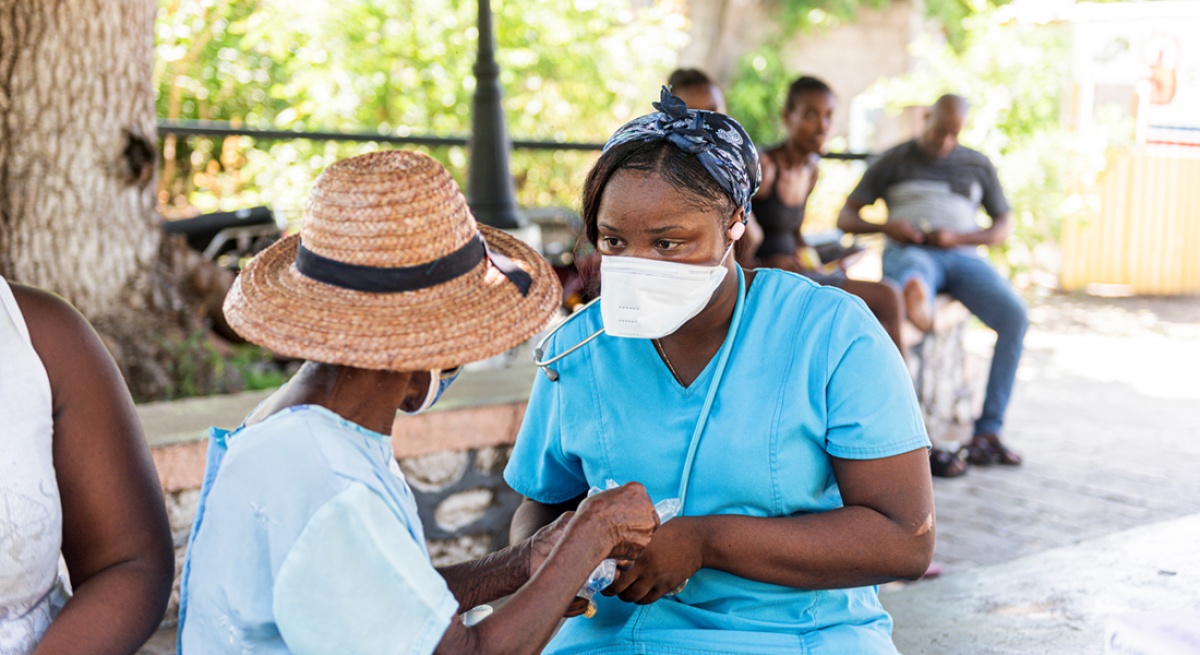Reflecting on PIH’s Earthquake Response in Haiti’s South, One Year Later
Teams provided emergency care, support, and long-term solutions alongside partners
Posted on Aug 11, 2022

One year ago, a 7.2-magnitude earthquake struck 80 miles west of the capital of Port-au-Prince, Haiti, leaving more than 2,200 people dead, 1,800 injured, and hundreds of families displaced. Authorities reported that 97 health centers and 1,250 schools were damaged or destroyed in the powerful quake, which had an epicenter near the cities of Les Cayes and Jérémie.
Zanmi Lasante, Partners In Health’s sister organization in Haiti, does not work in the region, but partners in the Ministry of Public Health and Population and non-government organizations in the South reached out to ask for assistance in launching a comprehensive emergency response, knowing Zanmi Lasante's depth of experience in critical care and effective response to the 2010 earthquake. Together, they provided direct care and support in the region, triaged complicated cases to neighboring hospitals, and, in some cases, airlifted patients to Zanmi Lasante’s Hôpital Universitaire de Mirebalais (HUM).
Unlike the devastating earthquake of 2010, the vast majority of first responders and clinicians in the 2021 response were Haitian—including graduates of HUM.
Emergency Response
Over the past year, Zanmi Lasante has:
- triaged and treated 67,658 patients from the earthquake zone with severe conditions, including those requiring orthopedic surgery, at HUM
- served 36,825 patients through multiple mobile clinics staffed by physicians, nurses, medical residents, and psychologists
- provided 3,113 survivors with psychosocial assistance, including food, hygiene products, and school materials
- sent 209 medical items and equipment, including portable ultrasound machines, to support hospitals in the South
This was all done despite significant challenges: gang violence prevented regular travel along a major route between the capital and the southern peninsula, gas shortages forced rationing across the 16 public health facilities supported by Zanmi Lasante, and COVID-19’s spread remained a concern nationwide.
Building Health Systems
As weeks turned to months, Zanmi Lasante and partners shifted from emergency response to medium- and long-term planning that focused on reinforcing the public health system—both at facilities supported by Zanmi Lasante and in the South—so that the next disaster might have less of an impact.
Within that stream of work, Zanmi Lasante has been supporting the construction of a surveillance lab and emergency ward at Hôpital Saint-Nicolas in Saint-Marc and reinforcing emergency and trauma staffing to respond to growing need for these services in the lower Artibonite region. The team is also making targeted improvements to water, sanitation, and hygiene infrastructure within all 16 of its supported health facilities—key to preventing water-borne illnesses that often come in the wake of natural disasters, such as hurricanes and floods.
Meanwhile, in the South, Zanmi Lasante teams continue to provide essential medical supplies and equipment across the earthquake-impacted regions, while also supporting the construction of three permanent health centers.
Focus on Medical Education
Last August’s earthquake highlighted the need to develop more opportunities for specialized training in Haiti, especially orthopedic and emergency residency programs for clinical nurses. Zanmi Lasante leaders are now mapping out curricula for these programs, which they plan to launch in October at health facilities in Saint-Marc and Mirebalais.
Eventually, these residencies will add to a suite of options available at Zanmi Lasante-supported facilities, including HUM, which received international accreditation in January 2020 for meeting the highest global standards as a teaching institution.
Since 2012, HUM’s medical education program has trained 152 Haitian clinicians across specialties, including family medicine, pediatrics, internal medicine, nurse anesthesia, surgery, emergency medicine, and OBGYN. HUM also offers fellowships in neurology, plastic surgery, and emergency sonography.
Of those graduates, 98% currently work in Haiti, with 88% working in PIH-supported or other rural health facilities.
Support Our Work
Donate to support PIH’s long-term commitment to the Haitian health system and its people.

